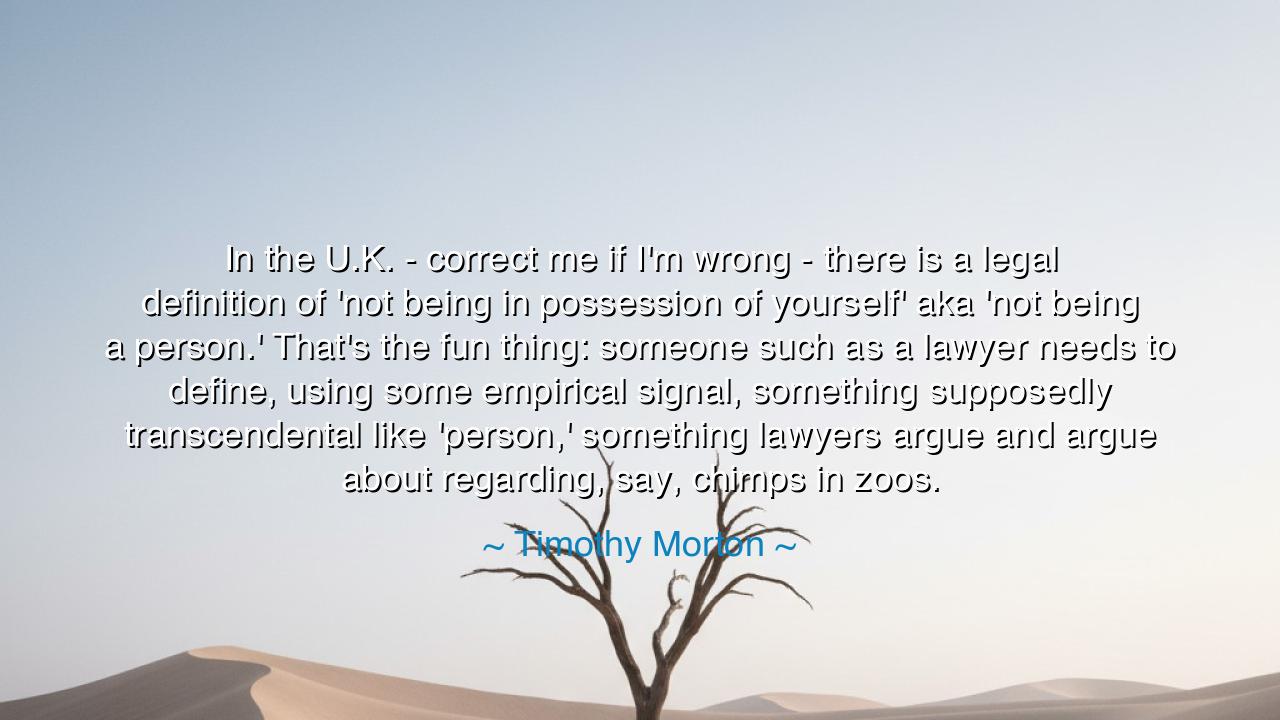
In the U.K. - correct me if I'm wrong - there is a legal
In the U.K. - correct me if I'm wrong - there is a legal definition of 'not being in possession of yourself' aka 'not being a person.' That's the fun thing: someone such as a lawyer needs to define, using some empirical signal, something supposedly transcendental like 'person,' something lawyers argue and argue about regarding, say, chimps in zoos.






The words of Timothy Morton pierce through the veil that separates law from philosophy: “In the U.K. – correct me if I’m wrong – there is a legal definition of ‘not being in possession of yourself,’ aka ‘not being a person.’ That’s the fun thing: someone such as a lawyer needs to define, using some empirical signal, something supposedly transcendental like ‘person,’ something lawyers argue and argue about regarding, say, chimps in zoos.” Beneath his wry observation lies a question as old as human thought — what does it mean to be a person? What mysterious boundary separates consciousness from object, self from thing, being from mere existence? Morton's words are a mirror reflecting both the majesty and the absurdity of human civilization: that we, in our quest for order, must translate the infinite mystery of personhood into the dry language of law.
To the ancients, the idea of a person was not merely legal but sacred. The Greeks called it prosopon — the “mask” through which a soul spoke — and the Romans gave us persona, the foundation of modern law, describing one who could bear rights and duties. Yet even then, this definition was flawed, for it excluded slaves, women, and foreigners. Morton’s reflection reminds us that our definitions of humanity, however rational they appear, have always been woven with power, bias, and fear. The legal system, for all its might, still grapples with the same paradox: how to capture the essence of being human in terms that can be enforced by the state.
Morton, a philosopher of ecology and interconnectedness, invites us to see the irony — that something as transcendental as selfhood must be measured by something as cold and empirical as a statute. In the courtroom, personhood becomes not a mystery, but a category: one that determines whether a human in coma has autonomy, whether an animal in a zoo possesses rights, whether an artificial intelligence deserves moral consideration. The law must draw a line, and yet every line it draws trembles before the vastness of existence. To define what a person is, one must first assume that such a thing can be defined — and that assumption itself is the great illusion of control.
Consider the trial of Ota Benga, an African man exhibited in the Bronx Zoo in 1906 alongside apes, as though he were one of them. He was not granted the dignity of being recognized as fully human, though he spoke, smiled, and wept. His story, like so many others, reveals the cruelty that emerges when the definition of personhood is left to those who wield power. Laws once declared that women were property, that slaves were three-fifths of a person, that indigenous peoples were subjects rather than citizens. Thus, every time we rely on “empirical signals” — the heartbeat, the DNA strand, the capacity for reason — we risk forgetting that the soul is not measurable, that humanity cannot be caged by definition.
Yet Morton does not despair; there is also irony and wonder in his words. For he points to the “fun thing” — that even in this struggle, we reveal our yearning to understand. The lawyer, the scholar, the philosopher — all attempt to grasp the ungraspable. When courts debate whether chimps in zoos possess rights, they do not merely argue about animals; they question the limits of empathy itself. To see personhood in the eyes of another creature is to expand the moral circle, to recognize the divine spark that glimmers even beyond our species. Each argument, though framed in the language of law, becomes a quiet prayer to the mystery of consciousness.
Thus, the quote is not only about law — it is about humility. Morton reminds us that every definition we write is a fragile map drawn upon an infinite sea. The legal system, for all its authority, cannot define what the heart already knows: that being a “person” is not merely about possession of the self, but about connection to others, to life, to awareness. To reduce that sacred relationship to a clause or condition is to mistake the shadow for the soul.
The lesson, then, is clear and timeless. We must guard against the arrogance of believing that law can fully contain truth. While we must have rules, let us write them with compassion, and let our definitions of “person” always leave room for wonder. Treat every being — human, animal, even the silent machine — as a potential bearer of consciousness, worthy of respect. For the measure of civilization is not in how well it defines personhood, but in how deeply it honors the mystery of being alive.
So remember this: when the philosopher laughs at the lawyer who tries to define the soul, he does not mock — he mourns, and he marvels. For the act of definition, however flawed, is the act of reaching toward meaning. And perhaps that is what makes us truly human — not our laws, but our endless, trembling attempt to understand the divine spark of personhood that no law can ever fully name.






AAdministratorAdministrator
Welcome, honored guests. Please leave a comment, we will respond soon